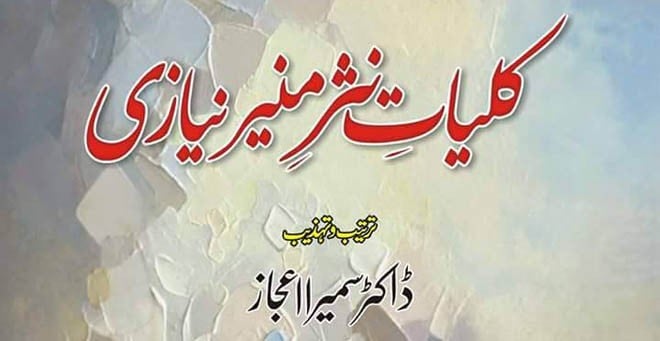
This thick volume celebrates the fact that Munir Niazi wrote sterling prose in the form of literary and social columns, letters, book reviews, a short story and an incomplete novel

While researching on the inimitable Munir Niazi for her PhD, Dr Sumaira Ijaz rummaged through almost everything related to the poet. The task was herculean indeed but she didn’t get bogged down by the amount of information available, and managed to collect formidable material on Munir Niazi. As a consequence of her efforts, last year, she was able to put out a comprehensive book on the poetry and life of the legendary poet and it was heartily welcomed by the literary fraternity.
But Dr Ijaz didn’t stop there. She felt that if there is a ‘Munir Niazi, the poet’, there is also a ‘Munir Niazi, the master prose writer’. That is how she came to collect almost all the prose writings of Munir Niazi and so Kuliyat-e-Nasr-e-Munir Niazi came into being.
Before this book was a released, a research scholar had already collected all of Munir Niazi’s Daily Jang columns and had them published together. But Dr Ijaz’s thick volume is different because it celebrates the fact that Munir Niazi wrote sterling prose in the form of literary and social columns, letters, book reviews, a short story and an incomplete novel.
According to Dr Sumaira Ijaz, Munir Niazi started writing literary and satirical pieces for weekly Saat Rang in 1950. Later, he contributed to Nusrat whose editor was Hanif Ramay. Next came Dhanak, and then he wrote for Daily Jang. This means his prose career spans over nearly five decades. He mostly wrote on literary topics and discussed upcoming books, poets and films. However, this does not take away from the fact that he commented on the socio-political scenario of the country with razor-sharp wit which remained his hallmark throughout his life.
His columns also threw light on literary meetings and trends in the Lahore in the early 1950s. He was a promising poet in those days and thus rubbed shoulders with the likes of Manto, Majeed Amjad, Intizar Husain, N.M. Rashid and Faiz.
In his column titled ‘Lahore Lahore Hai’ written on November 15, 1953, in Saat Rang, he writes that two important literary pieces of news are making the rounds in the city: Manto’s return from the hospital and the death anniversary of Meeraji. He had been to visit Manto at Mayo Hospital in Lahore and then Manto had told him that he had travelled to Moscow, but upon reaching, they had deported him back to Pakistan because he was travelling sans a ticket. Obviously, Manto was in delirium but the brief piece aptly captures the inner anguish of the great writer.
We learn from the book that Munir Niazi met Majeed Amjad in Sahiwal, then Montgomery, and instantly felt a likeness with him. His piece on Majeed Amjad that he wrote for Nusrat on June 4, 1961, is a treat to read. Munir Niazi found him to be a thorough gentleman, and he is all praise for his persona and poetry. The last sentence of the article is so sharp and acerbic that I can’t help translating it into English: "If the word ‘great’ had not been badly misused by the progressive writers, I would have summed up that Majeed Amjad is truly a great poet". This unadulterated admiration was rare of Munir Niazi because typically nobody escaped unscathed from his scalpel-like pen.
While discussing any literary person or a book he generously relayed his opinion, unpalatable for some, as it was. Writing in Saat Rang in October 1953 he takes to task A. Hameed for his novella Jahan Baraf Girti Hai. His objection was that Hameed borrowed heavily from John Galsworthy’s short story "The Apple Tree" and this fact was left unacknowledged.
Likewise, while reviewing a literary magazine he takes a jibe at Mirza Adeeb: "The play Lahoo aur Qaleen (Blood and Carpet) reminds me of another play Blood and Sand. While Lahoo and Qaleen is there in the play but drama is not there".
Dr Sumaira Ijaz is an Assistant Professor of Urdu at the University of Sargodha and the book under discussion is the outcome of her hard work and dedication. She travelled across many cities and their libraries in search of this material and she deserves much credit in hunting these pieces of prose by the eternal legend. The book has been published under the aegis of the Department of Urdu, University of Sargodha and one hopes more such projects will follow.